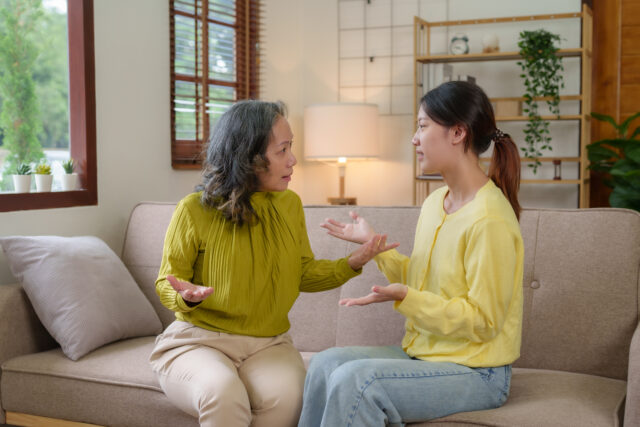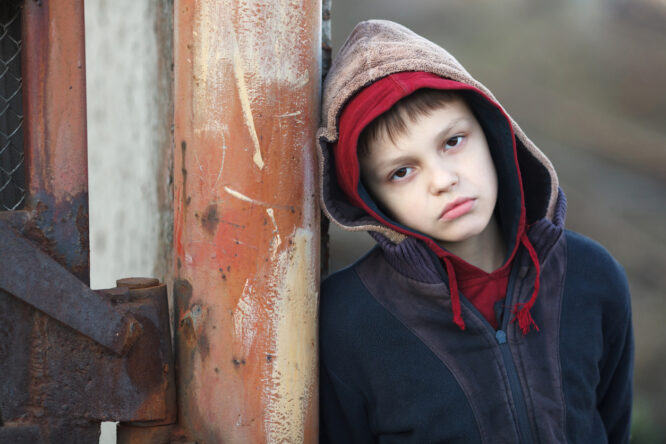Not all parent-child relationships are healthy, but they’re also not easy to walk away from.

From the outside, it’s easy to ask, “Why don’t they just cut them off?” But the decision to stay in contact with a parent who was abusive—emotionally, physically, or otherwise—is rarely simple. For many adults, that connection is layered with guilt, survival habits, hope, and fear.
It’s easy to become attached to what’s familiar, what feels obligatory, or what hasn’t been fully unpacked yet. Those are just some of the reasons adults might maintain relationships with abusive parents, even when part of them knows they’re still being hurt.
1. They were taught that family is everything.

From a young age, many people are told that family bonds are sacred and unbreakable. Walking away from a parent, even an abusive one, can feel like violating one of the most deeply ingrained social rules. That belief doesn’t disappear just because someone grows up. Even when there’s pain involved, they may feel obligated to stay in contact out of a sense of loyalty or fear of being judged for stepping away.
2. They’re still hoping for change.

Even after years of hurt, a lot of people still carry hope that their parent might one day soften, grow, or apologise. That hope can be incredibly hard to let go of, especially if the abusive parent occasionally shows moments of warmth. These glimpses of something better, however rare or brief, can keep someone emotionally invested. It’s not denial so much as the longing for something that was never really there, but still feels like it could be.
3. The abuse has been minimised or normalised.

If someone grew up in an environment where emotional cruelty, manipulation, or neglect was the norm, they might not fully recognise it as abuse. It just feels like “how things were.” Without that clarity, it’s easy to think, “Maybe it wasn’t that bad,” or “All parents mess up.” That internal confusion can make it incredibly difficult to set boundaries or walk away.
4. They’re afraid of family backlash.

Walking away from one parent can create a ripple effect with siblings, extended family, or mutual contacts. Some people fear being cut off, shamed, or blamed for “causing drama.” So, instead of risking social fallout, they stay quiet and keep the peace. Not because it feels good, but because the alternative feels even more isolating.
5. They’re still financially dependent.

In some cases, the parent continues to provide housing, money, or other forms of support. Leaving the relationship completely could mean losing security or facing major life instability. Even if that support comes with strings or emotional manipulation, the practical need can override the emotional cost—at least for a while.
6. They’re parenting their own kids now.

Some adults try to maintain contact with abusive parents in the hope of creating a healthier dynamic for their own children, offering a grandparent relationship that they themselves never had. They might think, “Maybe they’ll be better with the next generation.” It’s a hopeful idea, but one that can lead to repeated disappointment or new patterns of harm.
7. They’re not ready to face the grief.

Accepting that a parent is incapable of safe love means grieving something big: the version of childhood they never had, and the relationship they still wish was possible. For many, staying in touch is easier than sitting with that loss, no matter how painful it might be to keep them in their lives. It’s a form of emotional limbo that delays the mourning process.
8. They feel guilty for pulling away.

Even when abuse is clear, guilt often creeps in. That guilt might sound like, “What if they get sick, and I’m not there?” or “I should be more forgiving.” It’s often rooted in the belief that it’s your job to be the bigger person, even if that comes at your own expense. For some, that guilt can be more powerful than the memory of harm.
9. They’ve been gaslit for years.

Abusive parents often rewrite reality—downplaying what happened, blaming their child, or framing themselves as the victim. Over time, this can seriously distort how someone sees the past. If you’ve spent decades being told your pain isn’t real, it becomes hard to trust your instincts. If you can’t fully name the abuse, it’s harder to step away from it.
10. They want to prove they’re not like them.

Some people stay in contact just to prove to themselves that they’re different. They’re kind, forgiving, patient—everything their parent wasn’t. Cutting off contact can feel like becoming “cold” or “heartless,” which they’ve spent years trying not to be. So they keep showing up, not for connection, but as a statement: “I refuse to become what hurt me.” It’s a quiet form of resistance—but also one that can keep them stuck.
11. The abuse was emotional, not physical.

Many people think abuse only counts if it leaves visible scars. If the harm was verbal, controlling, or neglectful, it’s often harder to justify walking away, especially when other people say things like, “But they never hit you.” That kind of minimising can make someone feel like they’re being dramatic, even when their pain is valid. It keeps them second-guessing their right to leave.
12. The parent is ageing or unwell.

When an abusive parent starts getting older or developing health issues, it can create a new wave of guilt and obligation. Adult children might feel like they’re the only ones available to step in. This can feel like a moral weight—caring for someone who never cared for you properly. The sense of duty often overrides the memory of harm, even if it reopens old wounds.
13. They’re still trying to “earn” love.

Some adults maintain contact because they’re still trying to win over the parent who never gave them unconditional love. They keep showing up, hoping that if they’re good enough, helpful enough, patient enough—maybe they’ll finally be accepted. It’s heartbreaking, and it rarely works. However, the inner child still hopes that love can be earned if they just try hard enough.
14. They’ve been told it’s ungrateful to complain.

Especially in households where basic needs were met—food, shelter, education—people are often told they have no right to feel hurt. “You had a roof over your head” becomes a way to silence deeper emotional neglect or cruelty. That mindset sticks. It teaches people to measure abuse by material standards, rather than emotional wellbeing. And it keeps them quiet about everything that can’t be seen.
15. They’re still stuck in a fawn response.

For some, staying connected to an abusive parent isn’t a choice—it’s a trauma response. Fawning means people-pleasing, smoothing things over, and sacrificing your own comfort to keep someone else calm. It’s a survival habit learned in childhood, and it can follow someone well into adulthood. Until that pattern is recognised, it’s hard to choose anything different.
16. They’re still figuring it out.

Healing doesn’t happen on a schedule. Some people stay in contact because they’re not ready to let go, but they’re also not willing to fully pretend things are fine. They’re somewhere in the middle—processing, learning, trying. That space can look messy from the outside, but it’s often necessary. Not every connection is about acceptance or avoidance. Sometimes, it’s just the slow path toward clarity.


